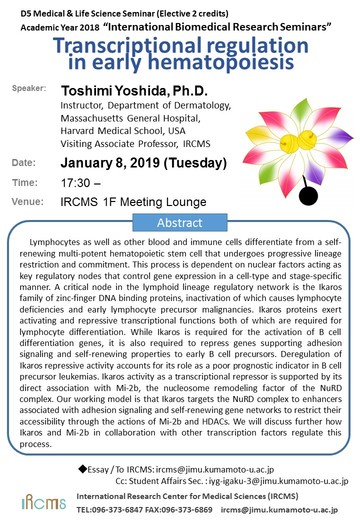- HOME
- News & Events
- [January 8]*D5 Medical & Life Science Seminar*
News & Events
[January 8]*D5 Medical & Life Science Seminar*
December 28 2018
The "D5 Medical & Life Science Seminar" course will be offered by International Research Center for Medical Sciences (IRCMS). It will run from May 2018 to March 2019, with lectures given by scientists affiliated or collaborated with the IRCMS. The course theme for this academic year is "Basic research for understanding disease mechanisms". The lectures will be given once a month, in English, and by leading scientists in the relevant research field. Students will be taught: 1) how normal physiological functions are maintained in human hematopoietic, vascular, immune, reproductive and nervous tissues and organs; 2) how abnormalities in these systems (e.g., cancer) are studied using experimental models; 3) cutting-edge technologies (including single cell level imaging and omics analysis) used for mechanistic understanding of these abnormalities; 4) efforts and progresses in finding cure for human diseases associated with these abnormalities; and 5) importance of understanding disease mechanisms using
Date : January 8, 2019 (Tue)
Time : 17:30 -
Venue : IRCMS 1F Meeting Lounge
Speaker : Toshimi Yoshida, Ph.D.
Title : Transcriptional regulation in early hematopoiesis
Abstract :
Lymphocytes as well as other blood and immune cells differentiate from a self-renewing multi-potent hematopoietic stem cell that undergoes progressive lineage restriction and commitment. This process is dependent on nuclear factors acting as key regulatory nodes that control gene expression in a cell-type and stage-specific manner. A critical node in the lymphoid lineage regulatory network is the Ikaros family of zinc-finger DNA binding proteins, inactivation of which causes lymphocyte deficiencies and early lymphocyte precursor malignancies. Ikaros proteins exert activating and repressive transcriptional functions both of which are required for lymphocyte differentiation. While Ikaros is required for the activation of B cell differentiation genes, it is also required to repress genes supporting adhesion signaling and self-renewing properties to early B cell precursors. Deregulation of Ikaros repressive activity accounts for its role as a poor prognostic indicator in B cell precursor leukemias. Ikaros activity as a transcriptional repressor is supported by its direct association with Mi-2b, the nucleosome remodeling factor of the NuRD complex. Our working model is that Ikaros targets the NuRD complex to enhancers associated with adhesion signaling and self-renewing gene networks to restrict their accessibility through the actions of Mi-2b and HDACs. We will discuss further how Ikaros and Mi-2b in collaboration with other transcription factors regulate this process.

